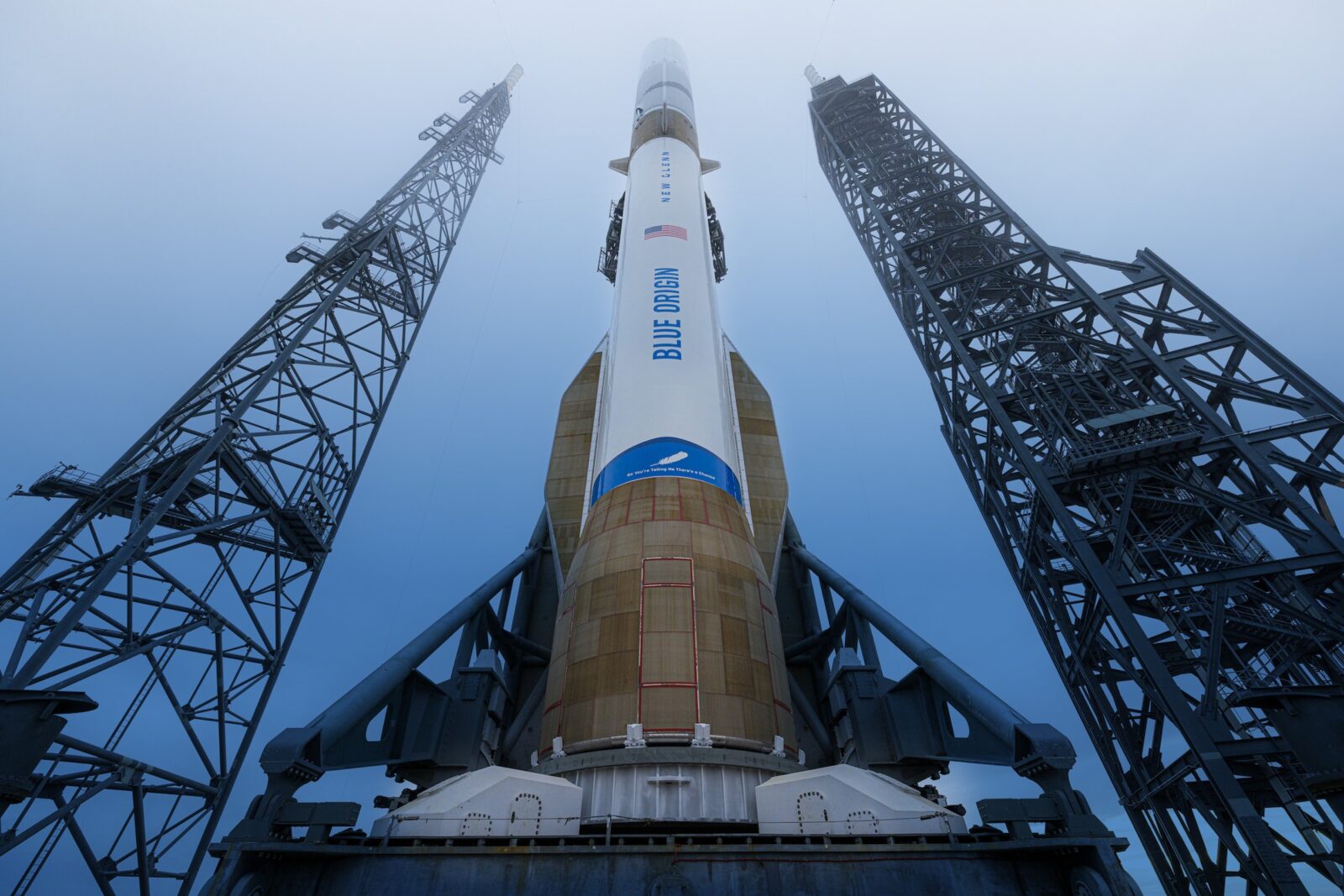- Home
- Billionaires
- Investing Newsletters
- 193CC 1000
- Article Layout 2
- Article Layout 3
- Article Layout 4
- Article Layout 5
- Article Layout 6
- Article Layout 7
- Article Layout 8
- Article Layout 9
- Article Layout 10
- Article Layout 11
- Article Layout 12
- Article Layout 13
- Article Layout 14
- Article Sidebar
- Post Format
- pages
- Archive Layouts
- Post Gallery
- Post Video Background
- Post Review
- Sponsored Post
- Leadership
- Business
- Money
- Small Business
- Innovation
- Shop
Recent Posts
Blue Origin Makes History: New Glenn Rocket Achieves Orbit on Maiden Flight, Marking New Era in Space Race

In a significant milestone for the commercial space industry, Blue Origin successfully launched its massive New Glenn rocket into orbit for the first time early Thursday morning, marking the company’s entry into the orbital launch market. The historic launch took place at 2:03 AM EST from Launch Complex 36 at Cape Canaveral Space Force Station in Florida.
The 322-foot-tall rocket, named after astronaut John Glenn, performed flawlessly during its primary mission, successfully delivering the Blue Ring Pathfinder payload to orbit approximately 12.5 minutes after liftoff. The achievement represents a crucial step forward for Jeff Bezos’s space company, which until now had only conducted suborbital flights with its smaller New Shepard rocket.
Watching from Mission Control, Jeff Bezos and company employees erupted in cheers and applause as the rocket achieved its primary objective of reaching orbit. Ariane Cornell, vice president of in-space systems for Blue Origin, celebrated the achievement during the live stream, stating, “We hit our key, critical, number-one objective, we got to orbit safely. And y’all, we did it on our first go”.
While the primary mission was successful, Blue Origin’s ambitious attempt to land the rocket’s first stage booster on a floating platform in the Atlantic Ocean did not succeed. The booster, equipped with landing legs, fins, and strakes, managed to ignite three of its engines for the reentry burn as planned but failed to stick the landing. Despite this setback, the company had previously acknowledged the challenging nature of this secondary objective, considering it would have been “icing on the cake” for the mission.
The successful launch comes after multiple delays and technical challenges. The initial launch attempt on Monday was scrubbed due to ice formation on a propellant line, and subsequent attempts were postponed due to weather conditions. The persistence paid off, as the rocket, powered by seven BE-4 engines producing nearly 4 million pounds of thrust, performed as intended during its crucial first flight.
New Glenn’s successful debut positions Blue Origin as a serious contender in the commercial space launch market, currently dominated by SpaceX. The rocket’s impressive capabilities include the ability to lift up to 45 metric tons to low Earth orbit and 13 metric tons to geostationary transfer orbit. The vehicle is designed for partial reusability, with Blue Origin aiming to launch and reuse each booster up to 25 times.
The mission carried the Blue Ring Pathfinder, a technology demonstrator designed to test core flight systems, ground operations, and operational capabilities as part of the Defense Innovation Unit’s Orbital Logistics prototype effort. The second stage of the rocket is now gliding through orbit with its payload, and its upper stage will later attempt to re-enter Earth’s atmosphere and burn up over a remote part of the ocean.
Looking ahead, Blue Origin has ambitious plans for New Glenn, with expectations to conduct six to eight space flights this year if all continues to go well. The company has already secured significant contracts, including launches for NASA’s Mars missions, Amazon’s Project Kuiper satellite constellation, and various commercial customers.
The successful launch garnered attention from across the space industry, including congratulations from rival SpaceX’s CEO Elon Musk, who acknowledged Blue Origin and Bezos “on reaching orbit on the first attempt”. This achievement marks a new chapter in the commercial space race and demonstrates the growing capabilities of private companies in advancing space exploration and technology.
- aerospace engineering
- aerospace technology
- BE-4 engines
- Blue Origin
- Cape Canaveral
- commercial rockets
- commercial space
- commercial space industry
- Commercial Spaceflight
- Florida
- Jeff Bezos
- launch complex
- launch services
- launch vehicle
- NASA
- New Glenn
- orbital access
- orbital capabilities
- orbital flight
- orbital mechanics
- orbital payload
- reusable rockets
- rocket development
- rocket launch
- rocket propulsion
- rocket science
- rocket technology
- satellite deployment
- satellite launch
- space achievement
- space advancement
- space development
- space economy
- space engineering
- Space Exploration
- space exploration advancement
- space industry
- space industry competition
- space industry development
- space infrastructure
- Space Innovation
- space launch
- space launch capabilities
- space manufacturing
- space milestone
- space mission
- space operations
- space progress
- space race
- space systems
- space technology
- space technology innovation
- space transportation
- SpaceX competition
Recent Posts
Categories
- 193 Countries Consortium Partner1
- 193cc Digital Assets2
- 5G1
- Aerospace & Defense48
- AI37
- Arts3
- Banking & Insurance11
- Big Data3
- Billionaires1,261
- Boats & Planes1
- Business332
- Careers13
- Cars & Bikes79
- CEO Network1
- CFO Network17
- CHRO Network1
- CIO Network1
- Cloud10
- CMO Network18
- Commercial Real Estate7
- Consultant1
- Consumer Tech194
- CxO1
- Cybersecurity73
- Dining1
- Diversity, Equity & Inclusion4
- Education7
- Energy8
- Enterprise Tech29
- Events11
- Fintech1
- Food & Drink2
- Franchises1
- Freelance1
- Future Of Work2
- Games149
- GIG1
- Healthcare79
- Hollywood & Entertainment203
- Houses1
- India’s 1000 Richest1
- Innovation46
- Investing2
- Investing Newsletters4
- Leadership65
- Lifestyle11
- Manufacturing1
- Markets20
- Media327
- Mobile phone1
- Money13
- Personal Finance2
- Policy569
- Real Estate1
- Research6
- Retail1
- Retirement1
- Small Business1
- SportsMoney42
- Style & Beauty1
- Success Income1
- Taxes2
- Travel10
- Uncategorized13
- Vices1
- Watches & Jewelry2
- world's billionaires1,230
- Worlds Richest Self-Made Women2
Related Articles
Atos Surpasses 2024 Liquidity Targets with €2.19 Billion Year-End Position, Marking Strong Financial Recovery
French IT giant Atos SE has announced its estimated liquidity position for...
By 193cc Agency CouncilJanuary 22, 2025Innovative Gaming Meets Sustainability: Cranfield School’s “Game of Life” Wins Prestigious FT Teaching Award
In a significant recognition of innovative educational approaches, Cranfield School of Management...
By 193cc Agency CouncilJanuary 22, 2025Bitcoin Shatters Records, Surges Past $109,000 as Trump’s Inauguration Fuels Crypto Rally
In a historic moment for the cryptocurrency market, Bitcoin reached an unprecedented...
By 193cc Agency CouncilJanuary 20, 2025Billions in Child Trust Funds Remain Unclaimed as Young Adults Miss Out on Financial Windfall
A staggering £1.4 billion in Child Trust Funds (CTFs) remains unclaimed, with...
By 193cc Agency CouncilJanuary 20, 2025















Leave a comment